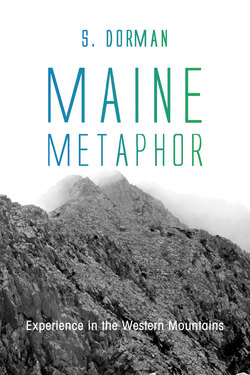Читать книгу Maine Metaphor: Experience in the Western Mountains - S. Dorman - Страница 12
На сайте Литреса книга снята с продажи.
Iron-eater
ОглавлениеI’m interested in eating. . . a subject of much of this narrative.
Drove to the town beach last night to learn what I could about the origin of rust stains there. Allen had mentioned the water at the bottom of our road, running from a ditch red with rust/oil. The submerged leaves were coated with this rusty substance. Was it naturally occurring, or toxic result of nonpoint pollution—or something else beyond the reach of my personal knowledge?
The town’s recreation committee was meeting at the beach to assess its condition and make plans for refurbishment. From their talk now it seemed the beach would really come together this year. The Department of Environmental Protection was being consulted as to whether sand could be added to deposits already laid by the stream. I followed the five townspeople to the irregular waterline. A bearded man, apparently not of our group, was tramping the stream-shore bordering one side of the beach. Where pond and sand met it was evident that storms of this past week had eroded the beach. And water was lying across the scraggly surface in pools. Waves rippled in where shoreline had been but days before.
On some gravel deposits in a higher corner of the beach an oily coating was present. It was dark blue and sheeny. My own road rust-stains, though readily evident, were now under water—water for the most part seeming clear.
I asked the recreation committee what it was, and the majority thought it rust from road run-off. But one member said that these iron-like deposits are all over the town: lots of iron in the soil, in water, even in his own well. I remembered then that when we lived on a pond north of here water poured from our tap smelling of rotting vegetation, sulfurous, leaving rust stains on everything. Instead we drank water collected from a roadside spring three miles away.
The recreation committee didn’t seem concerned about the origin of the stain, because being natives they were used to seeing it. Nevertheless, seeing my concern, someone suggested checking with the Lakes Association to see if it had plans to take soil samples. A name was tossed out. Later I went home and got out the phone book.
The phone conversation led to more names and numbers; finally I spoke with Jim Chandler. Mr. Chandler is the education coordinator for the county Soil and Water Conservation District. He’s also on the board of directors of the Lakes Association. And it turned out that he was the lone bearded tramper I had noticed on the beach earlier. He cautioned that my inquiry was outside his field of expertise.
He thought the stain was an iron stain produced by iron-eating bacteria. They feed off iron in the environment. The mineral is a source of oxygen energy to these organisms. In multiplying they coat everything with decomposed material, iron in solution suitable for absorption by plants. Thus, when we eat plants our blood is enriched with its iron constituent, thanks to this process. And thanks to the lowly bacteria which we may tread underfoot daily.
Mr. Chandler compared the oily film caused by growth of the bacteria to foaming tea leaves in iced tea. People sometimes think stream water in undeveloped woodlands is polluted when they see this foam gathering in some nook. But if it smells like perfume then it is detergent or soap. If it smells like gasoline it is gasoline. But if it smells like decaying vegetation then it’s the humble iron-eater at work, part of the puzzle of our formation and feeding. The smell will tell.
Mr. Chandler suggested filling in the low spots where the rusty water collects. I thanked him for the information and hung up . . . more satisfied than ever with earth’s careful provision, but almost sorry that the mystery of rust pools on the road and town beach was now solved.
